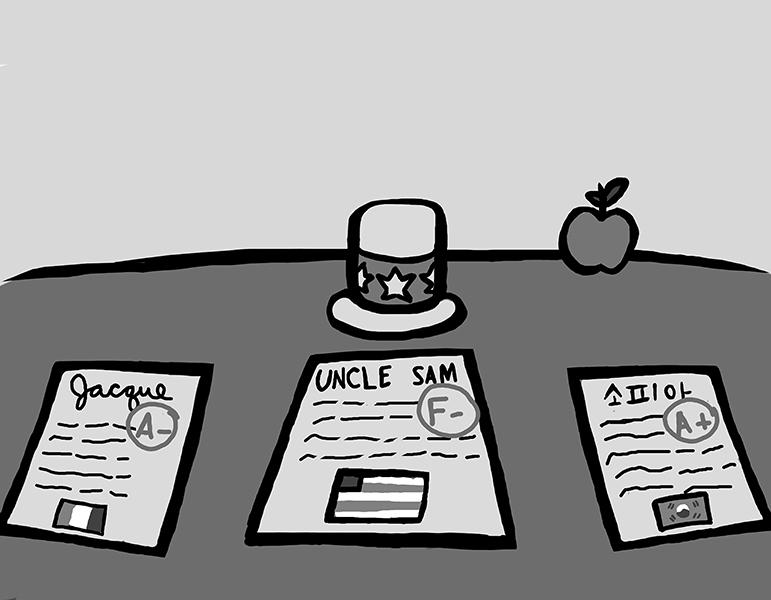The United States is ranked number one in many categories. Some achievements are outstanding, some are embarrassing and some are strange. The U.S. is ranked number one in the economy, Olympic gold medals, incarcerated people per 100,000 individuals, killing people with drones, and jorts (a combination of jeans and shorts.) However, there is one field where the U.S. does not reign supreme. That is education.
The Organisation for Economic Co-operation and Development conducts an examination for 15-year olds every three years in math, reading and science. This examination is called the Program for International Student Assessment (PISA).The exam can help predict many factors of a country, including its economy. According to Stanford University economist Eric Hanushek, had the U.S. scored 50 points higher on the PISA in 2000, its GDP in 2015 would be 4.5 percent higher. The latest PISA found that the U.S. was average in reading and science, but below average in math.
The U.S. finished 36th in math, 24th in reading and 28th in science out of the 65 nations that participated in the PISA. American students from more advantageous backgrounds do not do as well as students in other countries in similar situations. Only 43 percent of the students from “highly educated families,” or households where at least one parent has a college degree, are proficient in math. Yet students in higher-educated families from South Korea had a math proficiency rate of 73 percent. Other nations include Poland at 71 percent, Japan at 68 percent and Germany at 64 percent.
One major reason that America is lagging behind in education is that not all areas in the U.S. have the same level of education.While many countries face the difficulties of providing equal opportunities for every student, all of the high-performing countries were able to provide a high-quality education for all of their students.
Canada has made an effort to make sure that all public schools within their country will receive funds for a higher education based on a province’s needs and size. Their education system eliminates funding inequality between wealthier and poorer schools that exist in the U.S.
Finland, an educational powerhouse, has a rigorous teacher training program in its universities. By paying teachers more, Finland has made teaching one of the most popular occupations in the nation. The large teaching applicant pool has led to fierce competition in the profession for fewer slots thereby raising the standard of teaching. The U.S.’s teacher training system has been called “an industry of mediocrity” by the National Council on Teacher Quality. Only 10 percent of the over 1,200 tested teachers were rated as “high quality.”
As opposed to other institutions, Trinity does not have to be preoccupied with its education system. It is a private school that does not rely on government funds to function, and the school usually does better than the national average academically. In 2015, 25 percent of Trinity students scored at or above 680 in Critical Reading, 690 in Math, and 700 in Writing on the SAT. The national average in 2015 for the 25th percentile was 570 in Critical Reading, 590 in Math and 560 in Writing. Although the school may provide a comparatively better education than the average public day school in the U.S., Trinity does not easily outperform standards set by the top academic nations in the rest of the world. The overall mediocre education system and low educational standard in the U.S. can make Trinity’s education system seem superior by comparison.
Trinity Prep also inflates the grade point average (GPA) of its students. Trinity high school students are required to take Honors English courses in 9th and 10th grade. Students are also required to take Honors Biology in 9th grade. All upper school English, history and economic courses are either in the Honors system or the AP system. Honors courses are internally curved by three points, and AP courses are internally curved by five points. However, other schools around the world rarely find it necessary to inflate a student’s GPA because the GPA is of less importance in their college application process. Test scores may sometimes serve as a more reliable indicator because they cannot be inflated or adjusted. Patrick Mulloy, Trinity’s director of curriculum, is familiar with many education systems.
“England’s [standardized test] is more do or die, meaning their equivalent of an entrance exam is going to let you go to Oxford, Cambridge or other top-flight universities or it’s going to push you in [another] direction,” Mulloy said. “To be honest, I bet that there is a lot that we can learn [from other countries].”
Although Trinity is not directly affected by the U.S.’s low educational standing, the school should still be concerned. The school’s small student population and individualized teaching style can lead to being encased in a “bubble.” However, when other students graduate from school, they will enter the real world and feel the effects of an underperforming national education system. Not every student in the U.S. receives the education that Trinity students receive.
“Your future business colleagues [and] medical colleagues that you work alongside every day are going to come from a variety of different backgrounds and academic paths that [are different from] the education that students [at Trinity] are blessed with,” Mulloy said.
In the increasingly inderdependent world that is joined together by ever-evolving technology, the plunging educational system is apparent. It is a dilemna that concerns all American citizens alike.




